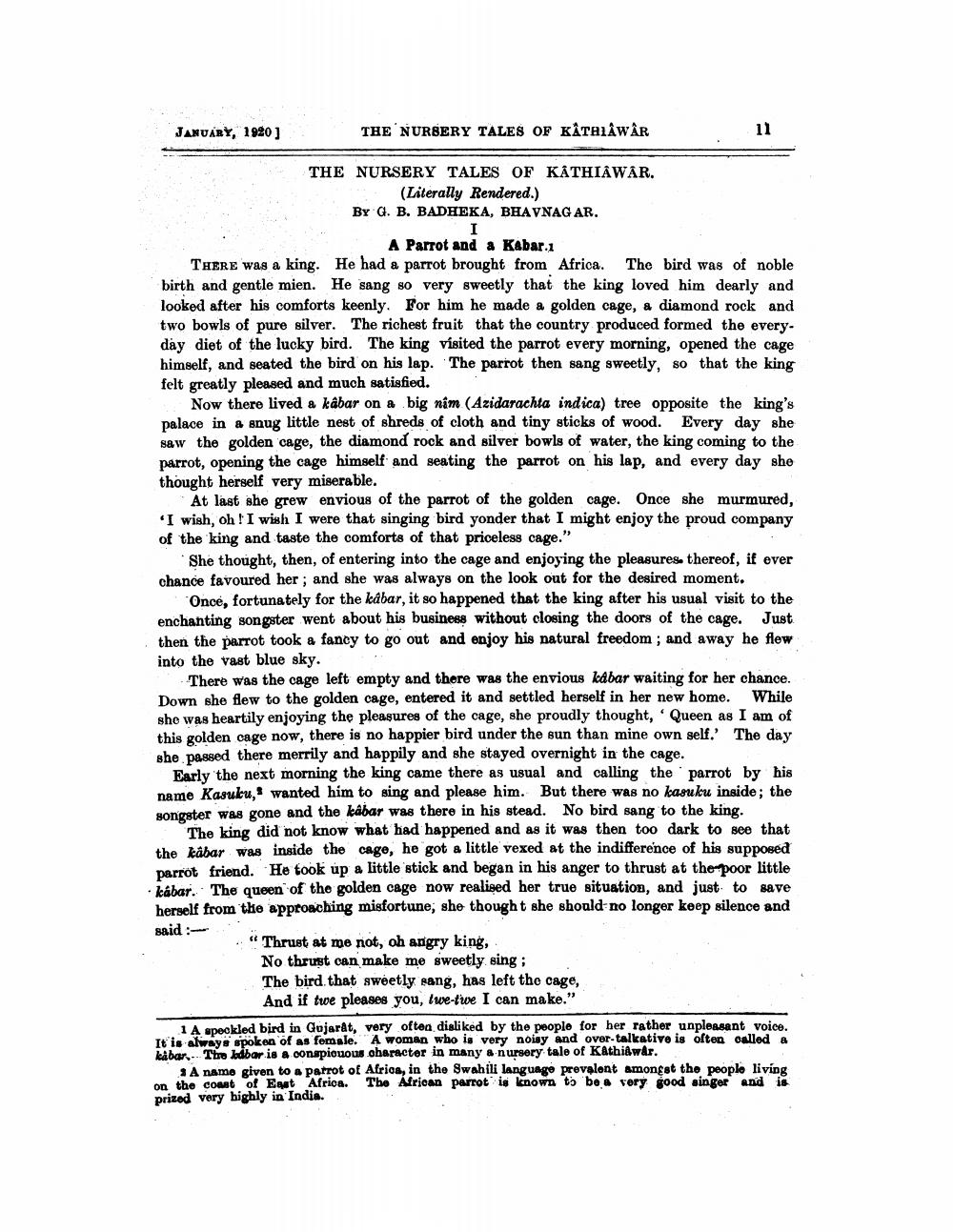________________
JANUARY, 1920 ]
THE NURSERY TALES OF KATALAWAR
THE NURSERY TALES OF KATHIAWAR.
(Literally Rendered.) BY G. B. BADHEKA, BHAVNAGAR.
A Parrot and a Kabar.1 THERE was a king. He had a parrot brought from Africa. The bird was of noble birth and gentle mien. He sang so very sweetly that the king loved him dearly and looked after his comforts keenly. For him he made a golden cage, a diamond rock and two bowls of pure silver. The richest fruit that the country produced formed the everyday diet of the lucky bird. The king visited the parrot every morning, opened the cage himself, and seated the bird on his lap. The parrot then sang sweetly, so that the king felt greatly pleased and much satisfied.
Now there lived a kabar on a big nam (Azidarachta indica) tree opposite the king's palace in a snug little nest of shreds of cloth and tiny sticks of wood. Every day she saw the golden cage, the diamond rock and silver bowls of water, the king coming to the parrot, opening the cage himself and seating the parrot on his lap, and every day she thought herself very miserable.
At last she grew envious of the parrot of the golden cage. Once she murmured, 'I wish, oh! I wish I were that singing bird yonder that I might enjoy the proud company of the king and taste the comforts of that priceless cage."
She thought, then, of entering into the cage and enjoying the pleasures thereof, if ever chance favoured her; and she was always on the look out for the desired moment.
Once, fortunately for the kábar, it so happened that the king after his usual visit to the enchanting songster went about his business without closing the doors of the cage. Just then the parrot took a fancy to go out and enjoy his natural freedom; and away he flew into the vast blue sky.
There was the cage left empty and there was the envious kabar waiting for her chance. Down she flew to the golden cage, entered it and settled herself in her new home. While she was heartily enjoying the pleasures of the cage, she proudly thought, Queen as I am of this golden cage now, there is no happier bird under the sun than mine own self.' The day she passed there merrily and happily and she stayed overnight in the cage.
Early the next morning the king came there as usual and calling the parrot by his name Kasulu,' wanted him to sing and please him. But there was no kasuku inside; the songater was gone and the kábar was there in his stead. No bird sang to the king.
The king did not know what had happened and as it was then too dark to see that the kåbar was inside the cage, he got a little vexed at the indifference of his supposed parrot friend. He took up a little stick and began in his anger to thrust at the poor little kábar. The queen of the golden cage now realised her true situation, and just to save herself from the approaching misfortune, she thought she should no longer keep silence and said :
. "Thrust at me not, oh angry king,
No thrust can make me sweetly sing; . The bird that sweetly eang, has left the cage, And if twe pleases you, Iwe-twe I can make."
1 A speckled bird in Gujarat, very often disliked by the people for her rather unpleasant voice. It'is always spoken of as female. A woman who is very noisy and over-talkative is often called a kabar.. Thro ladbar is a conspiouous character in many a nursery tale of KathiAwar.
I A name given to a patrot of Africa, in the Swahili language prevalent amongst the people living on the coast of Evt Africa. The African parrot is known to be very good singer and is prized very highly in India.




